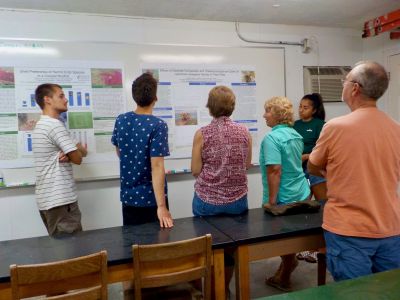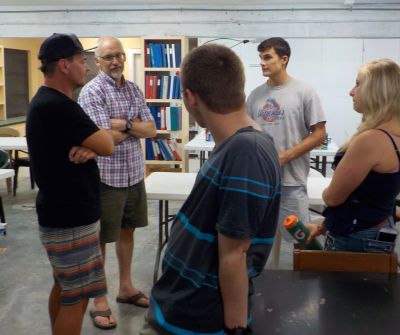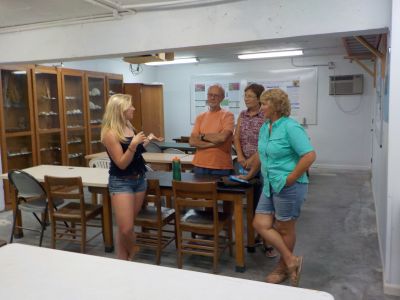
Thursday May 17, 2018
This morning (Thursday) students presented the results from their independent research projects in the form of both a written paper and a poster. The posters were printed and displayed for students to use in explaining their research projects to the public at an open house event we hosted in the evening. The open house began with a showing of the documentary Deep Dive at the church, followed by an informal tour of the facility. We were so grateful to have conversations with Layton residents, including the great grandson of Del Layton!
It was a wonderful way to end our trip, remembering the importance of the long-lasting relationships that have developed between Goshen College and Layton. We are equally grateful for the unique opportunity to study together in a
Thanks for joining us on our trip!
– Ryan Sensenig, Professor of Biology
Click the links to see the students’ research posters:
Effect of Thalassia testudinum and macroalgae percent cover on density of Astraea americana
Shell preference among hermit crab species in a Caribbean mud-flat
Below are some final reflections on the experience, written by each student.
The ocean is a realm far outside my experience. Studies in this course have allowed me to understand more clearly the complexity and vastness of this environment that covers so much of our plant. In ocean systems, one action can affect places thousands of miles away and this applies to human actions as well. Effects of marine systems span the globe and we have a responsibility to understand how our actions affect every part of marine systems and all they touch. – Lydia Good
My first jump into waters 30 ft down in the ocean was a bit nerve racking. You have so much water below you. You aren’t in your element. However, once I swam around and saw all the organisms around me and on the reef I realized these things were not paying attention to me. Marine systems are so vast. – Oliver Wisseman
This course helped me to develop a deeper appreciation for all living creatures. Mangroves, sponges, and seagrasses are all key players in the beautiful ecosystems full of fish, crustaceans, and other sea creatures that get all of the attention. Rather than looking at the health of a particular animal, we should focus on the restoration and preservation of Thalassia testudinum (sea grass) and Rhizopora mangle (red mangrove) that create the diverse environments necessary to support the marine ecosystems throughout the world, which inspire in us wonder and the awe. – Ally Roehr
One experience that will always stick with me is encountering manatees on our second day at the station. It was an amazing feeling to be able to see such a beautiful creature up close. It was stressed, however, that we do not touch the manatee because they shouldn’t become acclimated to humans. This put in perspective the way humans must refrain from our impulsive behaviors in order to not harm the environment and the creatures within it. – Keila Flores
My marine biology highlight was visiting Chico reef. After spending weeks studying the systems that provide habitat for young reef organisms, it was amazing to see the ecosystem come full circle. The large colorful fish, the impressive spiny lobsters and even the sharks would not be out at the reef without seagrass and mangrove habitats to support larval and juvenile fish life stages. I will always be able to appreciate that behind every photogenic coral reef are entire distinct marine systems that support it. – Gabe Miller
While on this trip I have experienced many things, including the visit to the Coral Restoration Foundation (CRF),s which is working to restore coral reefs. The key theme I saw while there is that the things we do (back home) affect the things around us (in the marine environment). I know things won’t change in one day, but the best thing to do is to make people aware and hopefully in a few generations from now we can get our marine systems back to “normal.” – Mezrae Watt
My highlight of the trip was not a specific day or snorkel trip. My highlight was the fact that Hurricane Irma did not destroy the Keys. The reefs are still thriving (though we did see damage to the coral), the mangroves are still rooted, Layton is re-building, and the seagrass is still there. Sure the sponges and jellyfish took a hit, but with time they will recover. It goes to show that hurricanes are a natural process, not the wrath of nature that comes to destroy everything. They make changes to an ecosystem like all other natural process. – Nathan Burns
My favorite part was when we visited the coral reef with Keys Marine Lab. I had never seen a coral reef before, and there were many more organisms around than at the other sites we had been to. I followed around a Grouper fish and observed a mutualism with a small cleaner fish. I also saw fish that hid behind the fan coral. Seeing the diversity of organisms around these reefs made me realize the importance of them and how they need to be preserved and restored. – Max Burkholder
These past 3 weeks have been a whirlwind of joy at seeing new creatures and despair of realizing their fate due to our humans’ exploitation of natural resources. Seeing dead coral of devastated reef systems truly exhibits the magnitude of what our human greed has wrought on systems largely unseen by us. If we want our children or grandchildren to marvel at the complexity of macroalgae, decapod larvae, and the complex interactions that marine environments offers, more people need to experience the Keys as have during this course. – Nat Dick
Through the experiences of this course, I have realized I often took our marine systems for granted. They are extremely complex and actually have a large impact on our lives, which is easy to forget when we don’t interact with this system much. They sequester a lot of carbon and produce most of our oxygen. They also produce a ton of food and ecosystem services such as erosion control. The list could go on and on. I will never forget the ocean’s role and will constantly be looking for ways to connect my actions on land to this system – Gabriel Eisenbeis
I loved the diversity of life I saw in the variety of ecosystems we visited. I enjoyed seeing the larger herbivores and predators such as manatees, turtles, and sharks – but I was also amazed by what we found at smaller scales. Noticing the connections between all the different components of the food chain and the connections between where different stages of a life cycle were found was awesome to me. – Geoff Miller







